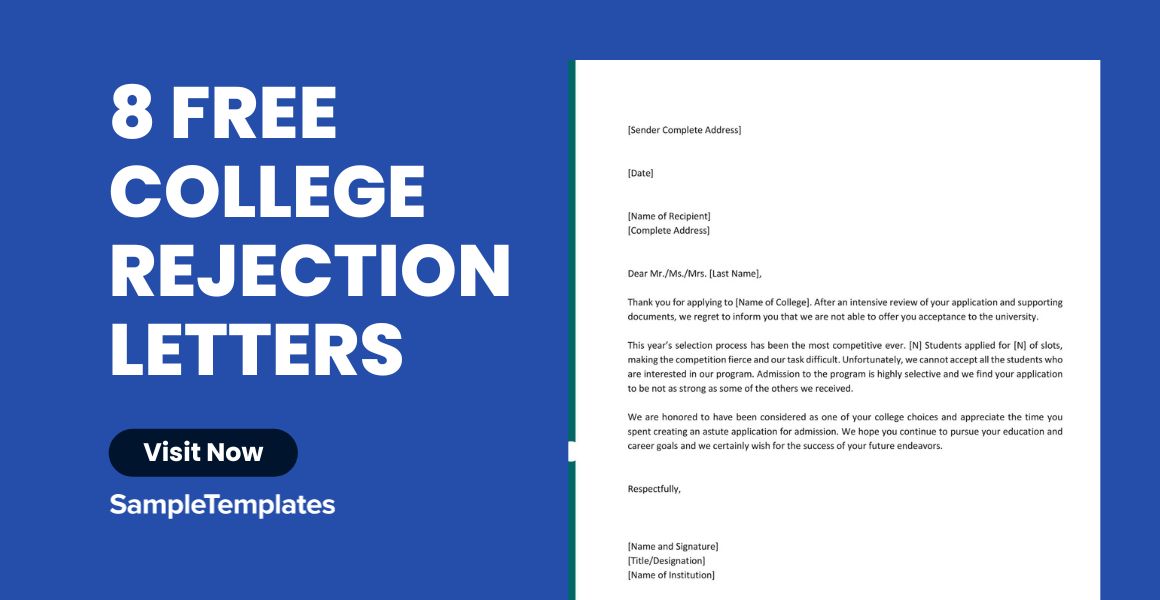Delivering unwelcome news with sensitivity is a hallmark of a compassionate admissions process. Our Sample College Rejection Letter Template embodies this approach, offering a framework for colleges to express regretful decisions with dignity. As a critical resource for admission departments, this letter template facilitates clear and empathetic communication, ensuring each student is addressed with care. It empowers educational institutions to handle these delicate interactions with the grace and professionalism that upholds their reputation while providing clarity and closure to applicants.
1. College Job Rejection Letter Template
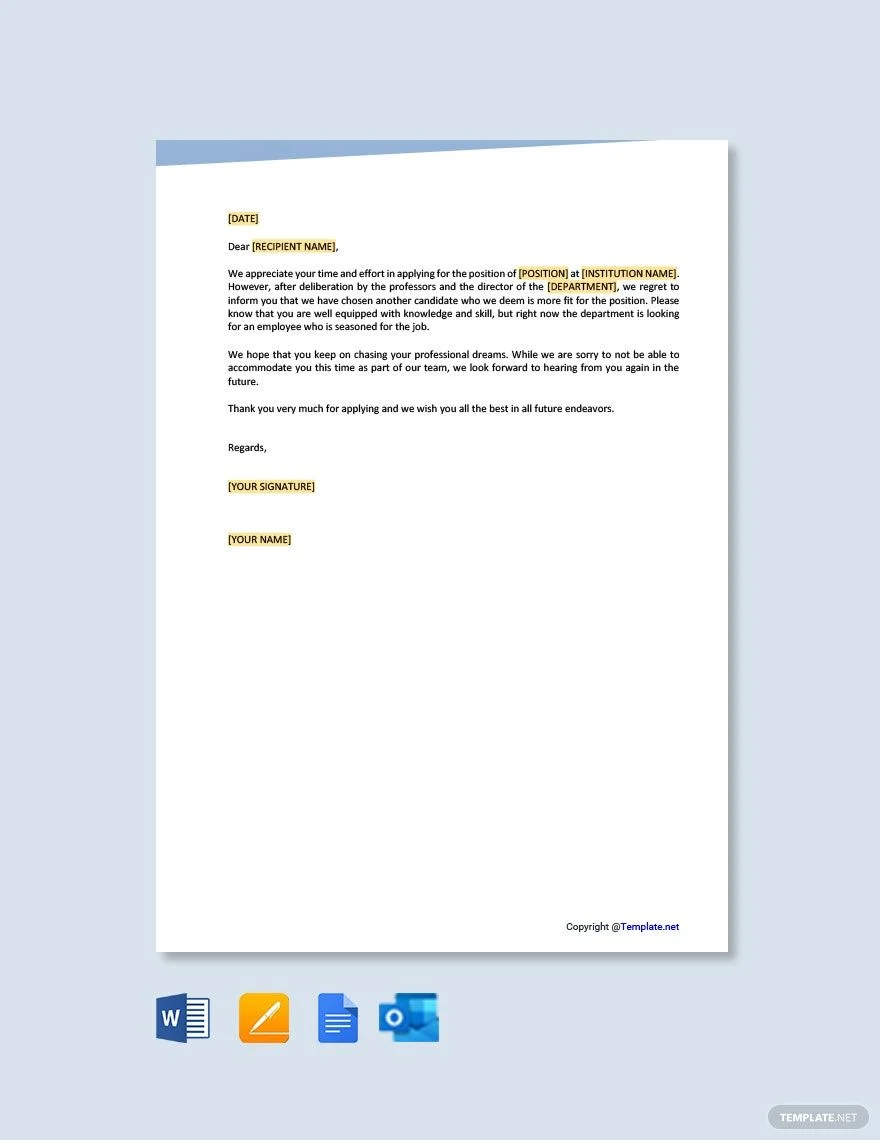
2. College Application Rejection Letter Template
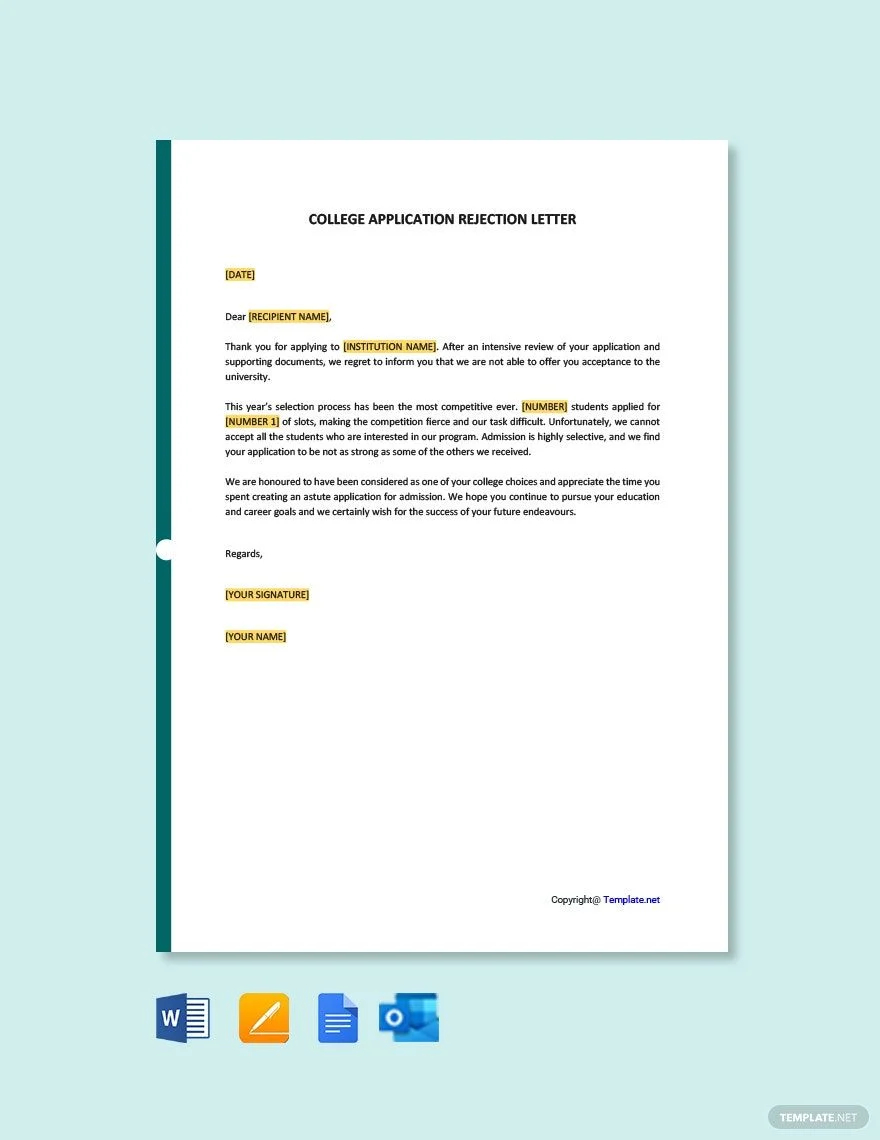
3. College Transfer Application Rejection Letter Template
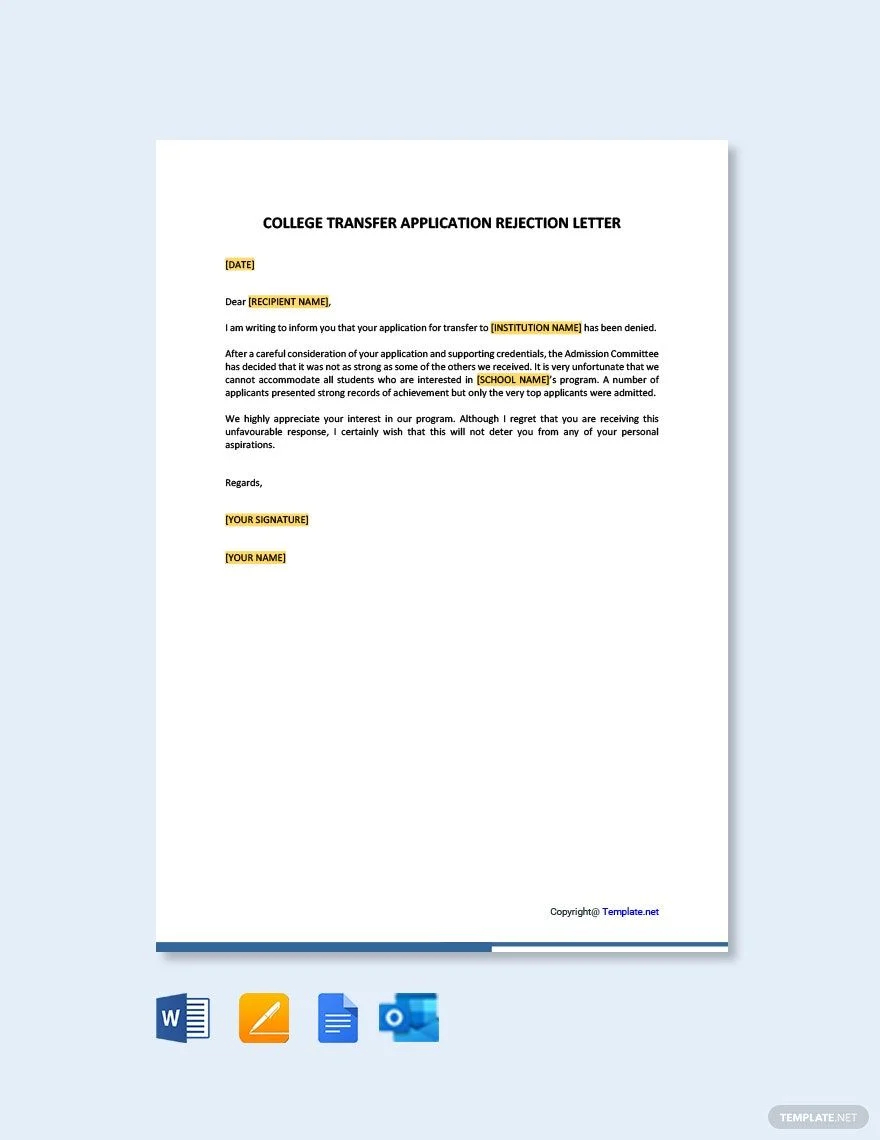
Tips on Writing a College Rejection Letter
Crafting a college rejection letter requires a thoughtful approach that balances straightforward communication with empathy. The goal is to inform the applicant of the decision respectfully and help them move forward. Here’s how to write an effective college rejection letter:
Begin with Respectful Acknowledgment
Start by expressing gratitude to the applicant for their interest in your institution. Acknowledging the effort and time they invested in their application is a respectful way to open the conversation.
Deliver the Decision Clearly
State the decision early in the letter without ambiguity. It’s important to be direct and clear to avoid any misinterpretation. Use a tone that is professional and avoid overly emotional language that could be construed as pity.
Provide a Concise Explanation
Offer a brief, generalized explanation of the selection criteria and the competitive nature of the process. Avoid detailed personal feedback to maintain the privacy and dignity of the applicant.
Avoid Clichés and Platitudes
Steer clear of phrases like “There were many qualified candidates,” which can come across as impersonal. Instead, personalize the message by referencing the specific institution or program to which they applied.
Encourage Future Endeavors
Encourage the applicant to pursue other opportunities and express confidence in their potential for success elsewhere. This positive note can help mitigate the sting of rejection.
Provide Resources or Alternatives
If possible, include information about alternative options, such as transfer applications, future admission cycles, or other programs that might suit the applicant’s interests and strengths.
Close with Good Wishes
End the letter on a positive note, wishing the applicant well in their educational pursuits. This demonstrates that the decision is not a judgment of their worth or potential.
Ensure Professional Presentation
The letter should be formatted professionally, using the institution’s letterhead and adhering to a formal letter format. Proofread the letter to avoid any typos or errors that could detract from the message’s professionalism.
Use a Personalized Salutation
Whenever possible, address the applicant by name. A personalized touch can make a difficult message feel more considered.
Follow Institutional Guidelines
Always adhere to any specific policies or guidelines your institution has regarding rejection communications.
By following these tips, the college rejection letter will serve its purpose with dignity and respect, maintaining a professional image for the institution while also being considerate of the applicant’s feelings. Remember, the aim is to deliver the message with enough compassion to soften the blow of rejection while providing the necessary closure for the applicant to continue their educational journey elsewhere.
4. Sample Rejection Letter Template
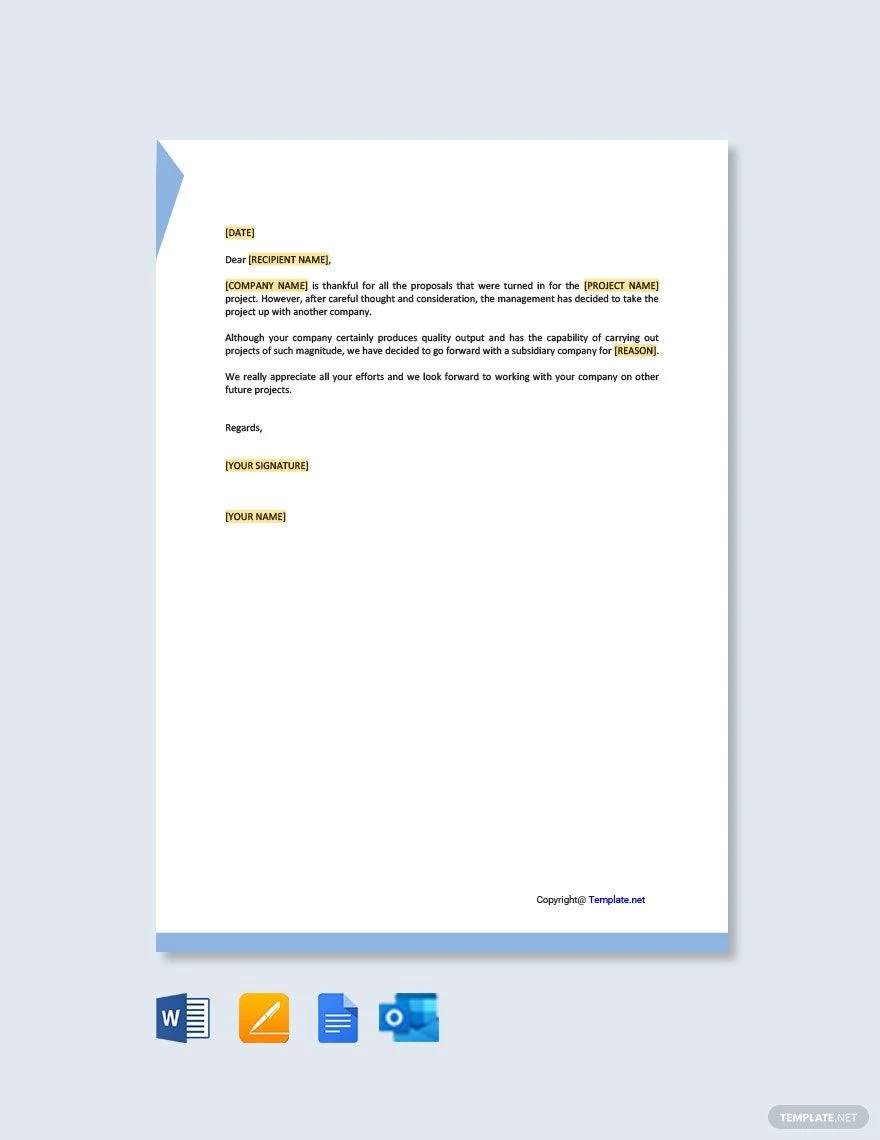
5. Rejection Letter Template
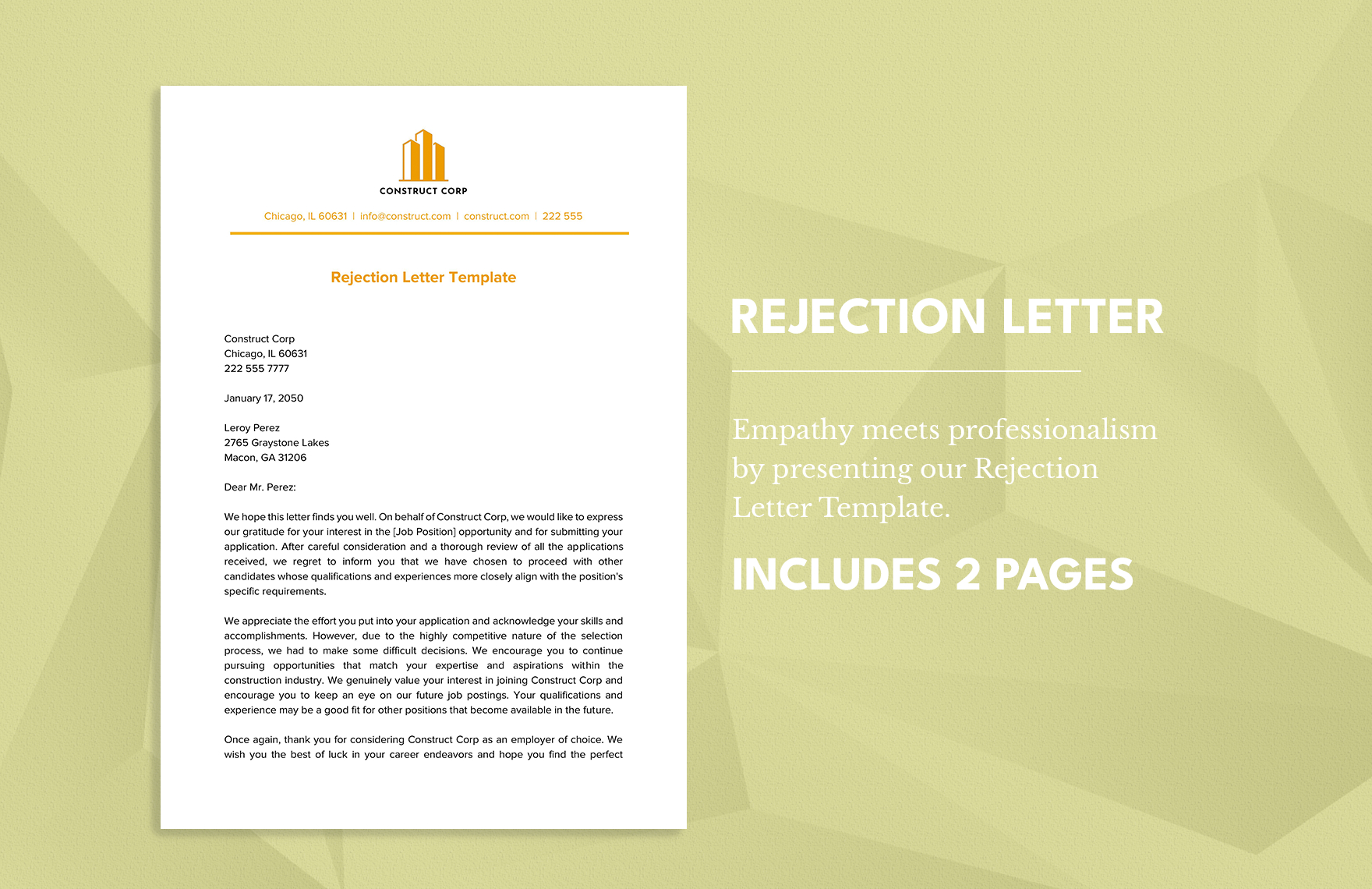
Things to Keep in Mind When You Receive a College Rejection Letter
Receiving a college rejection letter can be disheartening, but it’s a part of the journey to finding the right educational path. Here are some constructive ways to process and respond to a college rejection:
Acknowledge Your Feelings
It’s natural to feel disappointment, sadness, or even anger. Allow yourself to experience these emotions; they are a valid response to a significant moment in your life. Recognizing these feelings is the first step in moving forward.
Understand the Nature of College Admissions
Remember that college admissions are extremely competitive and often involve a high volume of applicants. Many factors play a role in admissions decisions, and a rejection does not reflect your worth or potential as a student or individual.
Read the Letter Completely
Carefully read through the rejection letter. Some colleges provide information about the decision-making process, and understanding these factors can provide closure or guidance for future applications.
Don’t Take It Personally
Colleges must make difficult decisions and cannot accept all applicants. Their decision is not a personal evaluation but a result of many considerations, including institutional needs and the pool of applicants.
Evaluate Your Options
Consider your other choices. If you’ve been accepted to other institutions, explore what they offer. If you are still waiting to hear back from other schools, focus on being hopeful about those prospects.
Consider Your Next Steps
Think about alternative plans. This might include applying to other institutions, considering community college, or exploring gap year opportunities. Use this as an opportunity to reassess what you want from your college experience.
Seek Support
Talk to family, friends, or a guidance counselor. They can offer comfort, advice, and a fresh perspective. Sometimes, discussing the rejection can help you come to terms with it and strategize next steps.
Learn from the Experience
Reflect on your application to see if there are areas you could improve. This could be beneficial if you plan to reapply to colleges in the future.
Avoid Comparisons
Stay away from comparing your path with others. Everyone’s educational journey is unique, and your route may take unexpected but rewarding turns.
Stay Positive and Persistent
Keep a positive outlook on your future. Many successful people have faced and overcome rejection. This experience can be a stepping stone to other opportunities that may be a better fit for you.
Remember, It’s Not the End
A college rejection letter is not the end of your educational aspirations. It’s a detour that could lead to new opportunities for growth and learning.
Receiving a rejection letter is undoubtedly challenging, but it can also be a valuable learning experience. By keeping these points in mind, you can navigate through this period with grace and resilience, poised for the next chapter in your academic career.
6. College Admission Rejection Letter Template
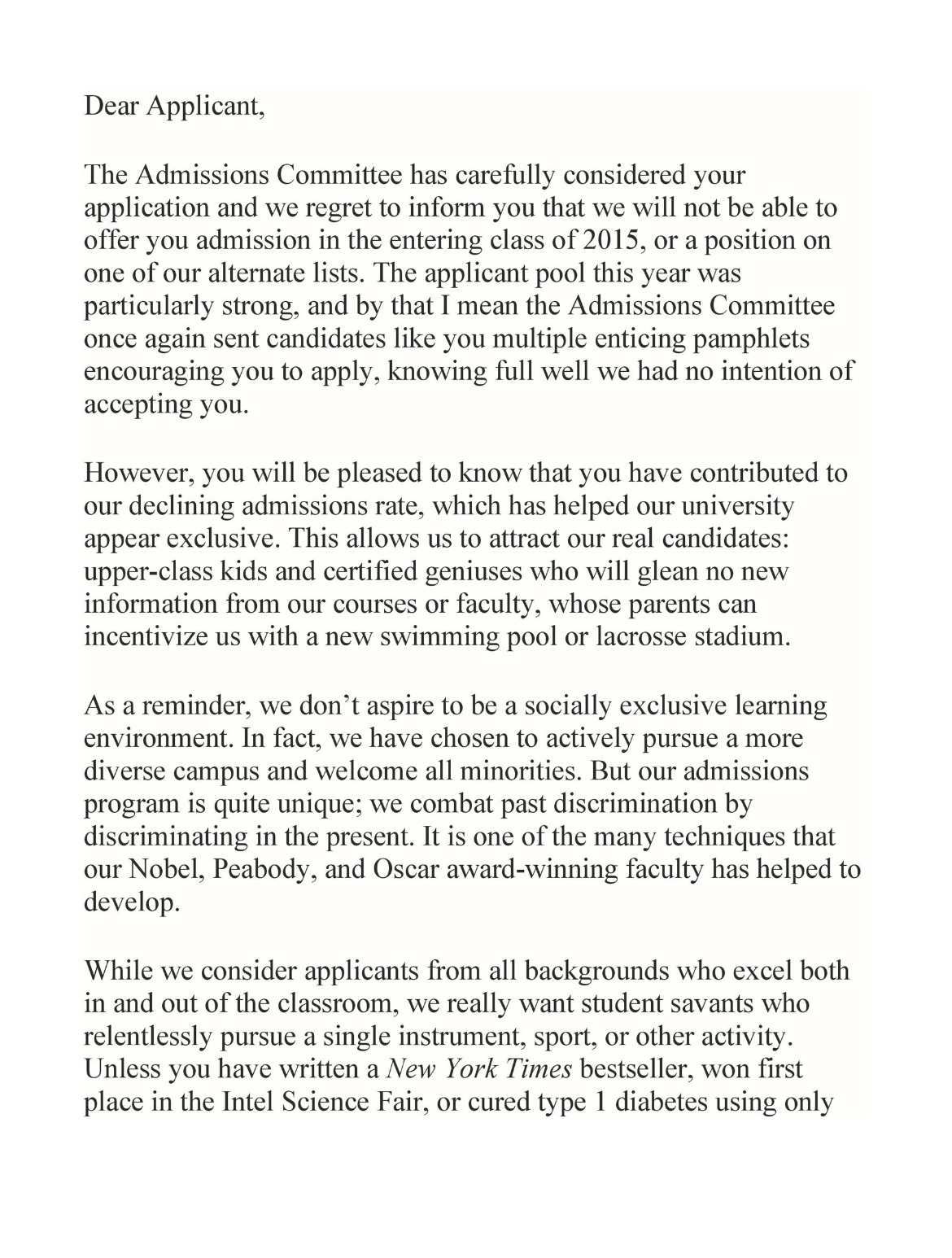
7. College Student Admission Rejection Letter
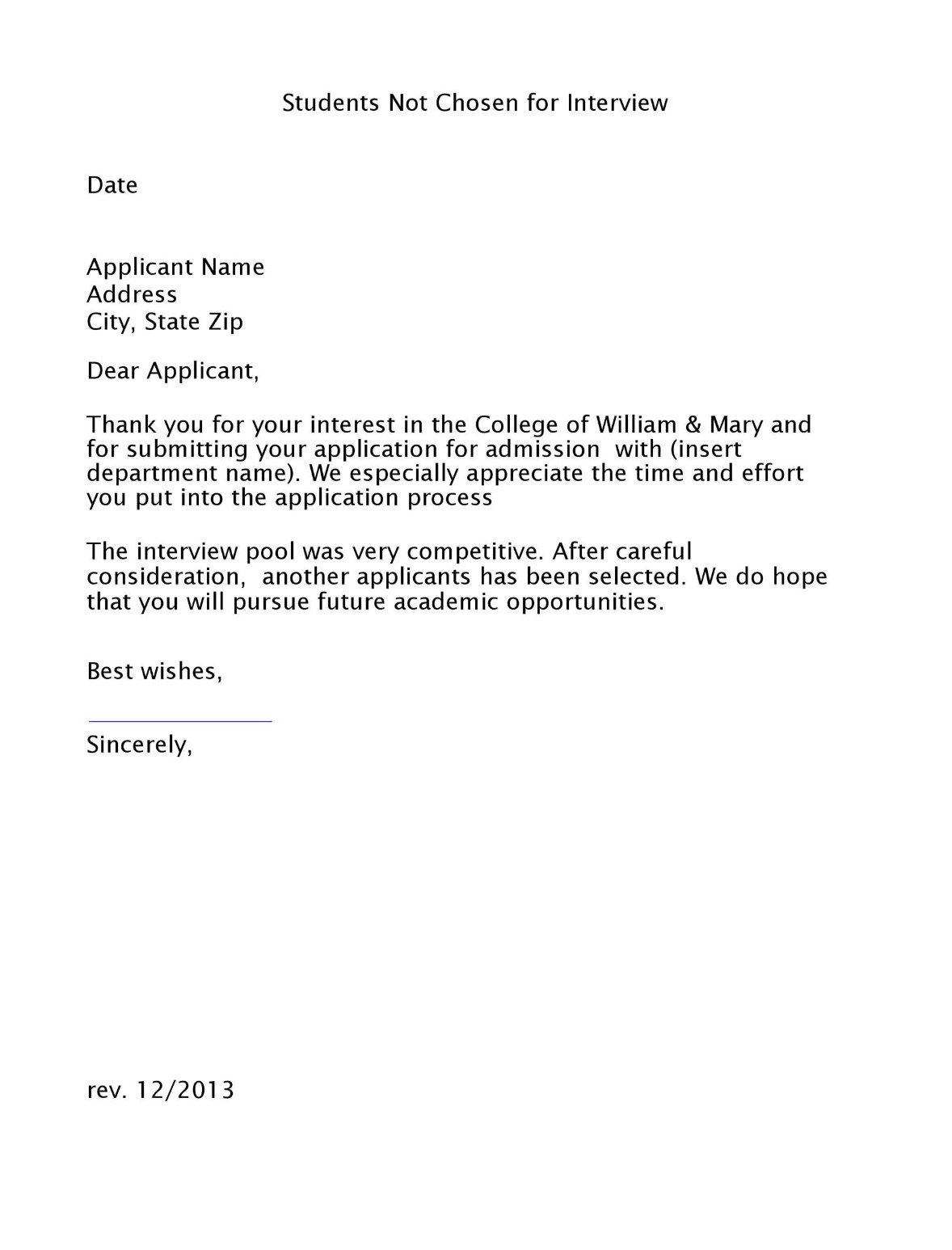
What Should I Do If I Get a College Rejection Letter?
It’s normal to feel a range of emotions after receiving a rejection letter. Disappointment, confusion, and even a sense of loss are common reactions. Allow yourself time to grieve the outcome but also try to keep it in perspective. This is one step in a larger journey, and it’s okay to be upset for a moment before you look ahead.
Gain Perspective
Rejections are often less about your qualifications and more about the competitive landscape of college admissions. Remember, schools are looking for a specific mix of students to create a balanced community and your rejection may not be about your worthiness but about fulfilling institutional needs. Keep in mind that many successful people have faced academic rejections and have gone on to achieve great things.
Review the Letter for Feedback
Some colleges provide personalized feedback within their rejection letters. If this information is available, use it to improve future applications. Understand that any feedback is a tool for growth and refinement, not a personal indictment.
Explore Other Offers
If you’ve received multiple college offers, it’s time to revisit those acceptance letters. Re-evaluate the programs, campus culture, and opportunities each college presents. This could be a chance to find a program better suited to your goals and interests that you might have overlooked.
Reassess Your Goals
Reflect on what you really want from a college education. What are the non-negotiable elements for you? Sometimes a rejection can lead to a more clear understanding of what you are truly seeking in a school.
Plan Your Next Steps
Consider alternative colleges that may have different deadlines, or that offer spring admissions. Look into each school’s application process and prepare to apply to additional schools if you decide that’s the best step for you.
Seek Advice
Utilize your support network by talking to mentors, family, and friends. They can offer new insights and help you brainstorm your next steps. Guidance counselors, in particular, can help you navigate the admissions landscape and suggest new strategies.
Broaden Your Horizons
Broadening your college search can uncover hidden gems that offer a fantastic education and college experience. Sometimes, smaller and less well-known institutions provide unique opportunities and can be the perfect fit.
Improve Your Application
Take a critical look at your application. Consider ways to enhance your essay, strengthen your test scores, or increase your community engagement. These improvements could make a significant difference in future applications.
Stay Engaged in Learning
Demonstrate your commitment to education by staying engaged academically. This could mean taking challenging courses, engaging in independent projects, or pursuing subjects that interest you through online platforms.
Consider a Gap Year
A gap year can be an incredible opportunity for personal growth and development. Plan a gap year with purpose—travel with an educational aspect, engage in volunteer work, or gain experience through internships or employment in areas that interest you.
Stay Positive and Proactive
Maintain a positive outlook and remember that this rejection is not a reflection of your potential. Use it as a motivation to propel you forward. With a proactive approach and a positive mindset, you’re setting yourself up for future success.
In every step after receiving a rejection letter, it’s important to stay focused on your long-term goals. Use this moment as an impetus to drive you, not to define you. Keep looking forward, as the right college experience for you is still within reach.
8. College/ University Rejection Letter Template
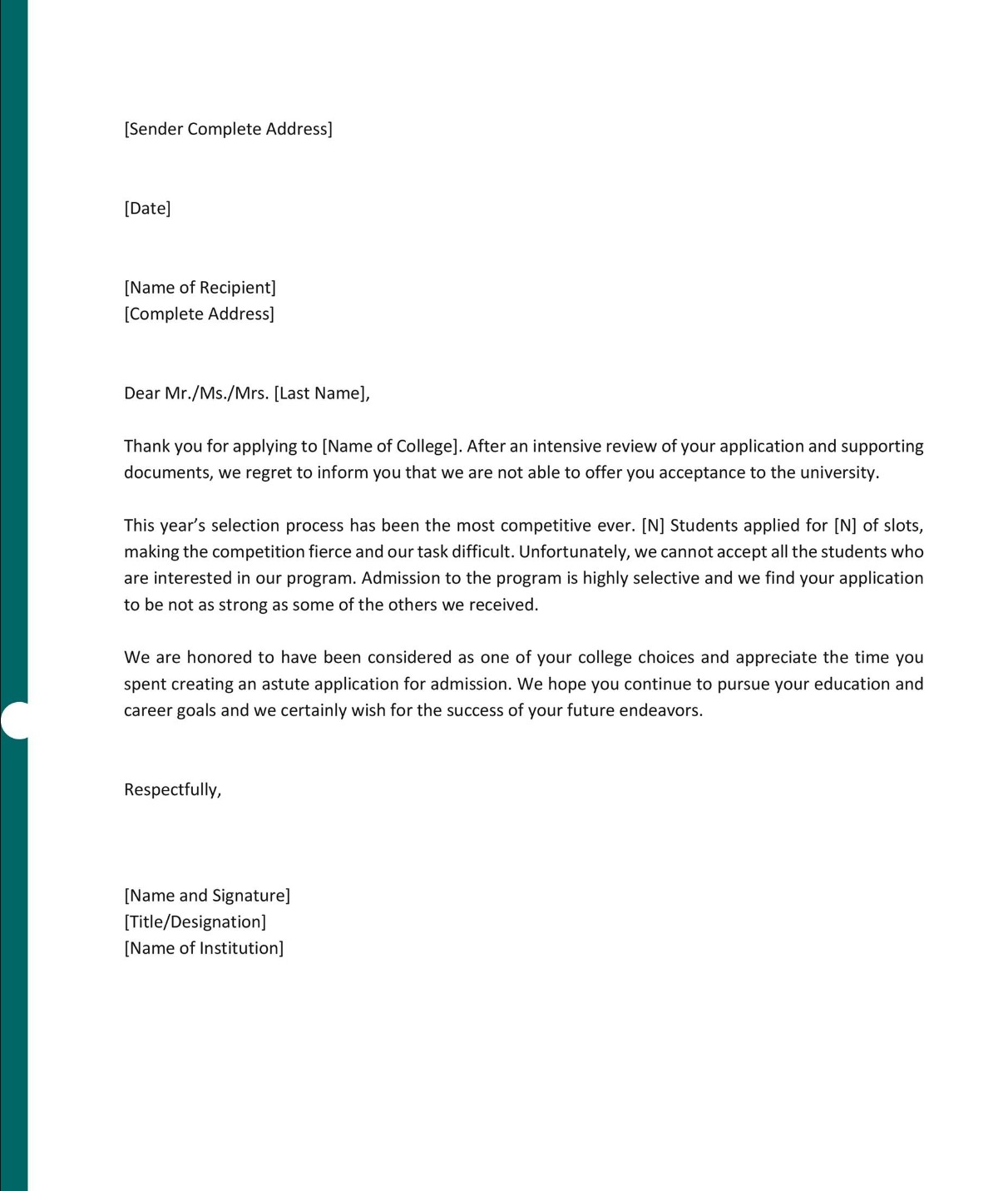
Why do colleges send rejection letters?
Colleges send rejection letters to communicate that an applicant has not been selected for admission. It’s a standard part of the admissions process, providing closure to applicants so they can pursue other educational opportunities.
A sample or template can serve as a guide for understanding the tone and structure of a professional rejection letter. If you’re on the admissions side, it can help you draft a respectful and clear rejection notice to applicants.How can I use a college rejection letter sample or template?
What should I avoid including in a college rejection letter?
Avoid any language that could be interpreted as personal criticism, overly specific reasons for rejection, or clichés that may diminish the applicant’s efforts.
Can I appeal a college rejection decision?
Some colleges have an appeals process, but it is typically reserved for extenuating circumstances or new significant information that was not considered in the original application. Check the college’s admissions website or contact the admissions office for specific policies.
How soon after an application deadline do colleges send rejection letters?
The timing varies by institution but usually occurs after all applications have been reviewed and decisions have been made, which can be anywhere from a few weeks to several months post-deadline.
College rejection letters are a standard part of the admissions process. While they may initially bring disappointment, they also mark a pivotal point for reflection and redirection. Use them as a catalyst for growth and exploration of new educational opportunities that await you.
Related Posts
Letter of Intent Samples & Templates
Letter of Intent for a Job Samples & Templates
Lease Proposal Letter Samples & Templates
Letter of Inquiry Samples & Templates
Character Reference Letter Samples & Templates
Claims Letter Samples & Templates
Response Letter Sample & Templates
Follow Up Letter Samples & Templates
Sample Project Proposal Letter Templates
Donation Letter Samples & Templates
Addressing a Formal Letter Samples & Templates
Grievance Letter Samples & Templates
Sample Sponsor Thank You Letter Templates
Sample Letters of Request
Sample Cover Letter for Teacher
